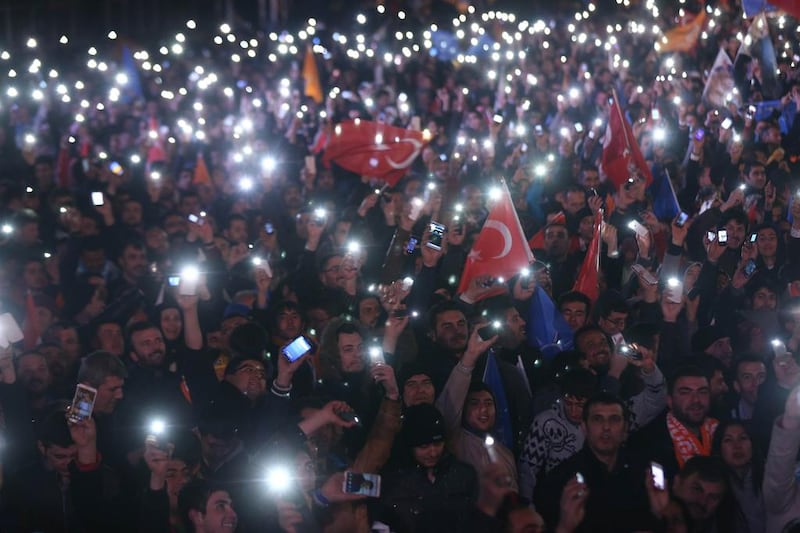Emre Uslu is an academic and newspaper columnist who took on Turkey’s prime minister, Recep Tayyip Erdogan, and lost.
Despite nearly a year of opposition protests and allegations of corruption levelled by critics such as Mr Uslu, Turkey’s ruling Justice and Development Party (AKP) won nearly 46 per cent of the vote in local elections on Sunday, a triumph for Mr Erdogan.
Currently in Brussels, Mr Uslu is now unsure about returning to Turkey after the prime minister vowed in his victory speech to crack down on opposition.
“Those who managed could flee. More can flee tomorrow,” Mr Erdogan said. “I have filed criminal complaints about some of them ... As I have said, from now on, we’ll walk into their dens. They will pay for this. How can you threaten our national security? Syria is in a state of war with us.”
Though he was not specifically named in the speech, Mr Uslu, a former counterterrorism police officer, said Mr Erdogan appeared to be connecting him to a leaked audio recording of senior officials allegedly discussing military intervention in Syria. The leak was described as espionage by Mr Erdogan’s government and YouTube was blocked in Turkey after it was used to release the recording.
“They are trying to build a case to use as a political campaign,” Mr Uslu said. “I am one of the figures they can target.”
In the run-up to the elections, Mr Erdogan blamed the release of other secretly recorded conversations and a wide-ranging corruption investigation directed at him and his allies on the Gulen movement, an influential fraternity of businesses, NGOs and media outlets.
The Gulen movement is also powerful within Turkey’s police and bureaucracy, making it uniquely capable of shaking Mr Erdogan’s grip on power.
Members of the movement claim to draw influence from a US-based Turkish preacher named Fethullah Gulen, against whom Mr Erdogan lashed out at repeatedly while campaigning.
Mr Uslu writes for two newspapers seen as affiliated with the Gulen movement, but said he was not a member.
On Saturday, lawyers for Mr Erdogan filed lawsuits against five men including Mr Uslu for insulting him on social media.
Mr Uslu said Mr Erdogan’s lawyers also requested he be prevented from travelling.
“This is part of a harassment campaign,” said Orhan Kemal Cengiz, a human-rights lawyer and columnist for Zaman, a Gulen-affiliated newspaper that Mr Uslu also writes for. “[Mr Erdogan is] using this discourse, but there are no arrests. But by using this discourse more than 10,000 police officers were removed from their offices, using this discourse he sent away many judges and prosectors.”
Following the launch of the corruption probe in November, Mr Erdogan hit back by firing or reassigning thousands of police officers and seeking increased control over the judiciary.
By implying that Mr Uslu is connected to the leaked recording, Mr Erdogan appears to be advancing a war of public perception ahead of presidential elections in August and parliamentary elections next year.
Internal AKP rules prevent Mr Erdogan from a fourth term as prime minister and he is likely to run for president in a bid to retain power, something the Gulen movement appears to see as an existential threat.
“The real influence of the Gulen movement is not their popular vote, which is perhaps one or two per cent,” said Sinan Ulgen, a Turkey expert with the Carnegie Endowment for International Peace. “They have an importance through their positions in the Turkish administration and through their strength in the media.”
With the local elections showing Mr Erdogan’s continued popularity, the combative prime minister is expected to renew his crackdown on opposition, with Mr Uslu among his first targets.
“It was not that I am afraid of Erdogan’s lawyers … What scared me was Erdogan’s speech...” Mr Uslu said.
“They are connecting me with this case because I am a former police officer. I am still well connected with the police, some of the policemen they fired are my friends.”
He was not expecting to be gone from Turkey for long when he travelled to Brussels on March 1 to conduct academic research on the Turkish diaspora. He had been fired from his job at a private university in September after what he claimed was government pressure. Now, he is realising that he might be away from home longer.
An intense government crackdown on the Gulen movement is coming, he said. “[Mr Erdogan’s] priority is on economic sources of the Gulen movement.”
Mr Uslu also admitted being surprised by the scale of Mr Erdogan’s victory in the elections. In 2009 local elections, the AKP only received about 39 per cent of the vote.
“I thought the Turkish people would say no to his oppressions, his pressure,” Mr Uslu said.
With the presidential election approaching, it appears likely that Mr Erdogan will keep up his aggressive tactics.
“Erdogan feels vindicated by his strategy of polarisation, which enabled him to consolidate a large block of support,” said Mr Ulgen.
“We’ve just entered the election cycle. There’s no real reason for him to change his winning strategy.”
jvela@thenational.ae





